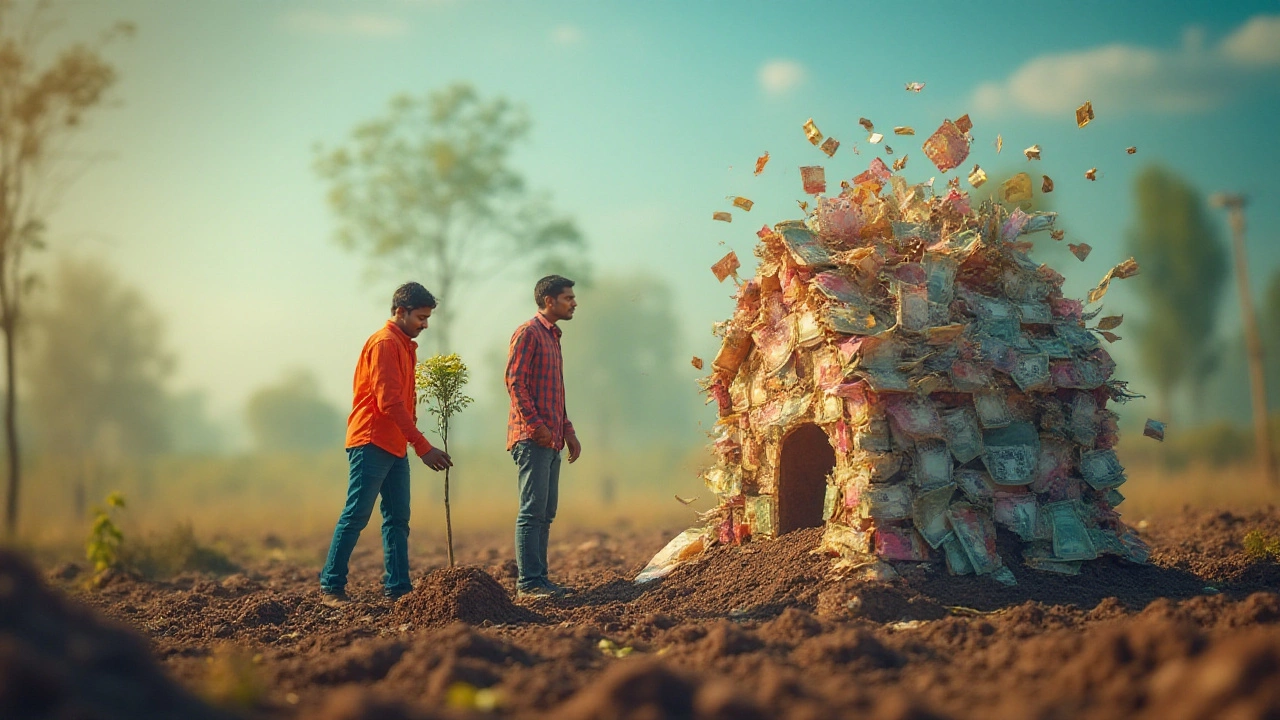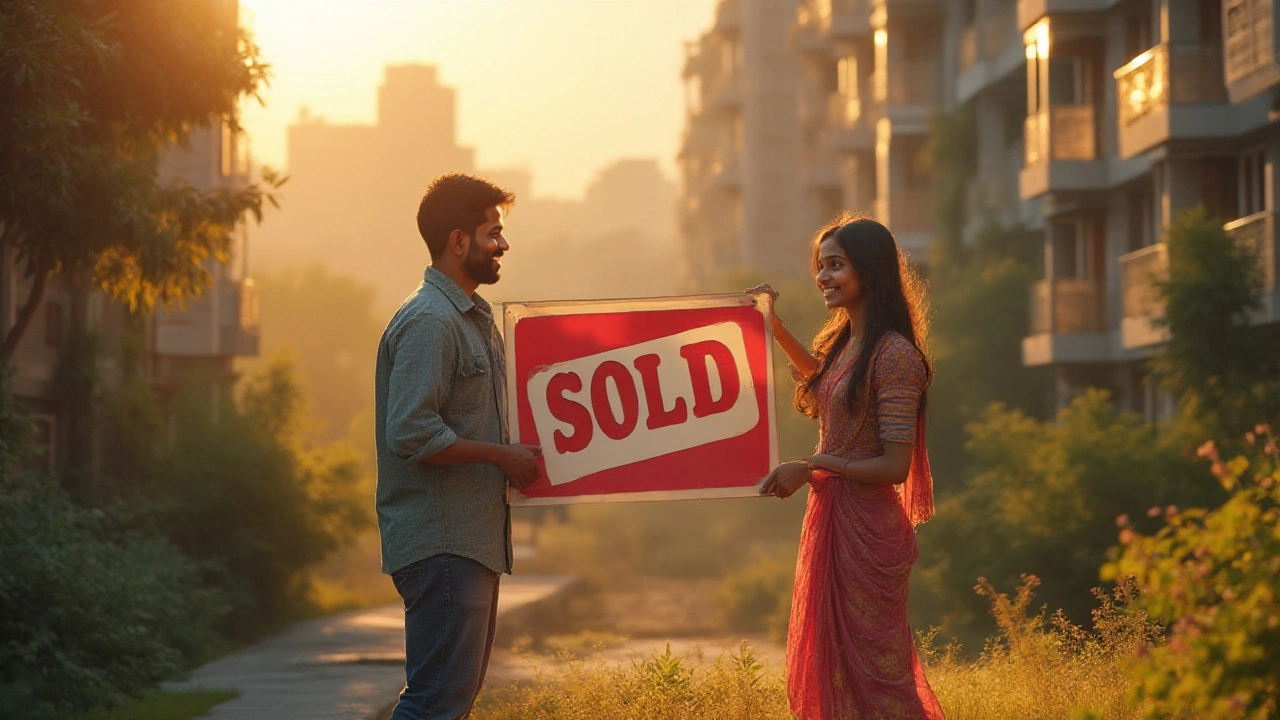You ever wonder why the richest people seem to own half the city? It’s not just your imagination. There’s a jaw-dropping stat anyone chasing wealth needs to know: about 90% of all millionaires made at least part of their fortune through real estate. That isn’t some myth made up by agents trying to score a commission; it’s been repeated by heavy-hitters like Andrew Carnegie and echoed through every street where property values have exploded. Paris, Mumbai, New York, Tokyo, Sydney—if you look at who owns what, it’s clear that land and buildings make millionaires out of regular folks every single day.
Why Real Estate Holds the Millionaire Key
People love to fantasize about striking gold with startups, the share market or crypto, but real estate keeps getting rich quietly in the background. It’s not just about luck; the numbers are brutally honest. In fact, a recent 2023 report from Knight Frank showed that property assets make up nearly half the total portfolio of self-made millionaires globally. Unlike digital assets, land doesn’t vaporize overnight. Property comes with physical utility—people have to live somewhere, businesses need places to run. It’s demand that’s not going away, no matter how fast technology moves.
Why does it actually work? First, property values have a habit of rising, driven by population growth and people's need for housing. It’s not just some abstract concept for economics textbooks—it happens on your street, right now. In Melbourne alone, median house prices have more than tripled since the early 2000s. Try finding any savings account pulling off returns like that.
There’s also leverage. Unlike most investments, you don’t need to fork out the entire property price upfront. Banks will lend against bricks and mortar—a rare display of faith compared to other asset classes. For someone starting with $100,000 in savings, real estate lets you buy assets worth half a million or more. As the value rises, your share in the growing pie gets bigger while your loan shrinks with every payment. That’s the kind of automatic wealth-building you just don’t get elsewhere.
And then there are the passive income possibilities. Rental yields—money in your pocket every month—mean property can pay you to own it. In prime parts of Sydney, gross rental yields average 3-4%, and regional centres can go as high as 6-8%. It doesn’t sound massive, but when you add capital gains, the results can be staggering over time. When you combine income, tax breaks, and potential appreciation, it's easy to see why real estate is the golden ticket for building wealth.
The Real Numbers: Real Estate’s Role in The First Million
Let’s get concrete. A 2024 Wealth Report by Credit Suisse noted that among individuals holding $1 million or more in net assets, 87% had substantial real estate holdings. These are people who didn’t start with a trust fund. Many began small—buying a rundown flat, a patch of land on the city fringe, or a fixer-upper that no one else wanted.
Take a classic Melbourne story. Someone bought their first home in Werribee for AUD 340,000 a decade ago. Today, it's easily valued above AUD 750,000. If they rented out a spare room or the whole house and moved on to a second place, their rental and equity gains would dwarf double-income bank savings over the same period.
Looking worldwide, the stats are similar. The US Federal Reserve’s Survey of Consumer Finances (2022) found homeowners have, on average, 40 times more net worth than renters—a mind-blowing gap if you care about building wealth. Even when property cycles dip, the long-term trend points up, especially for those who buy and hold.
| Country | Avg. Property Asset Share in Millionaire Portfolios (%) |
|---|---|
| Australia | 48 |
| United States | 44 |
| United Kingdom | 50 |
| Singapore | 53 |
The truth is, hardly anyone becomes a millionaire flipping stocks or running dropshipping websites. It almost always comes back to property. That’s why when you ask today’s millionaires how they made their first million, most give credit to smart property buys.

Real Estate Myths That Kill Your Chances
Of course, there are stubborn myths that stop many from pulling the trigger. The biggest? That you need a fat bank account to invest. Yes, prices are higher now, but creative strategies mean you don’t need $200K in your pocket. Many successful investors started with shared ownership, family pooling, or simply targeting affordable suburbs with big upside potential. Government grants for first-time buyers, low-deposit home loans, and even rent-to-own options have opened doors for many.
Another mistake is believing you must find the perfect property in a blue-chip suburb. Some of the best returns have come from ‘ugly ducklings’: rundown homes in emerging areas. Renovators are making serious cash by adding value where others see problems, not potential. The key is research—knowing the market, understanding renter demand, and actually spending time walking neighbourhoods at different hours.
People also give up before even starting because of the myth that property is a ‘set and forget’ investment. The reality is, millionaires treat it like a business. They monitor interest rates, track local infrastructure plans, and fix things before they turn into costly disasters. If you’re willing to get your hands dirty and learn, there’s space for ordinary people to become extraordinary investors.
Finally, many just get analysis paralysis—worrying endlessly about timing the top or bottom of the market. Every decade, the people who waited for a 'perfect' market missed out on massive gains, while others who acted—imperfectly—watched their wealth multiply. Action and patience, not timing, make the biggest difference.
Everyday Millionaire Moves: Steps that Actually Work
You don’t need to be a genius to crack the property code, but you do need a strategy. Here’s a blueprint many used to get there:
- Start small but start soon. Waiting for massive savings or a market crash just means higher prices later. The person who bought their first unit at 25, even with scraped-together savings, is lightyears ahead of the person still 'researching' at 35.
- Leverage, but don’t over-extend. Banks might offer to lend you more than you’re comfortable with. Stick to a number where you can breathe if rates go up. Millionaires hate losing sleep over mortgage repayments.
- Add value, don’t just wait. Simple renovations, adding a second dwelling, or even running Airbnb rooms can amp your returns. It can mean the difference between a flat market and substantial equity growth.
- Diversify within real estate. Don’t just stick to one location or property type. Some go residential, others try retail, holiday rentals, or even affordable housing for government contracts.
- Learn the local rules. Being blind to zoning, council regulations, or the true cost of repairs is a recipe for regret. Seasoned investors run the numbers, know their tenants’ rights, and always leave buffer cash for surprises.
- Network like mad. Speak to real agents, builders, and property managers. Street-level intel can help you spot deals before they show up on public websites.
If you keep your eyes on cash flow and growth potential, it's possible to turn one property into a small portfolio surprisingly fast. Millionaires don’t hoard—for them, it’s about steady, compounding moves over many years, not one giant leap.

Looking Ahead: The Future of Millionaires and Real Estate
Right now, people keep asking if it’s too late. The media is full of doom and gloom over housing bubbles and the cost of entry. But step back and take a wide view: in 1975, almost nobody believed the little weatherboard homes in Brunswick or Collingwood would ever break seven figures. Now, it’s normal. In Sydney, the same thing happened with Western suburbs. Property cycles always bring ups and downs, but long-term wealth almost always favours those who held on—even through tough times.
Tech is shaking things up with fractional property investment platforms, opening doors for smaller investors. Crowdfunded real estate and digital trading of property shares mean you don’t need all the cash to start. International interest is also changing the local market—overseas buyers view Australian property as a safe haven, and their demand keeps values strong.
Renting isn’t out, either. As cities grow denser and more transient, rental demand keeps climbing. That points to ongoing opportunities for savvy property owners who adapt and offer what tenants want—from pet-friendly leases to high-speed internet and eco-friendly upgrades.
If you talk to real millionaires, they’re always scanning the next neighbourhood, the next zoning law, the next infrastructure project. Most didn’t land on their feet just by buying a single house—they scaled, learned, sometimes failed, but always held onto the lessons. The ones still thriving see property as a living thing, not a set-and-forget investment. They revisit their strategy regularly, invest in knowledge, and don’t get spooked by the headlines.
The money game hasn’t changed as much as the noise around it. Those who own land, own their future. Real estate still accounts for the lion’s share of new millionaires, and there’s space for anyone willing to roll up their sleeves, take a smart risk, and play the long game. Millionaires are made on the ground, not online.







Write a comment